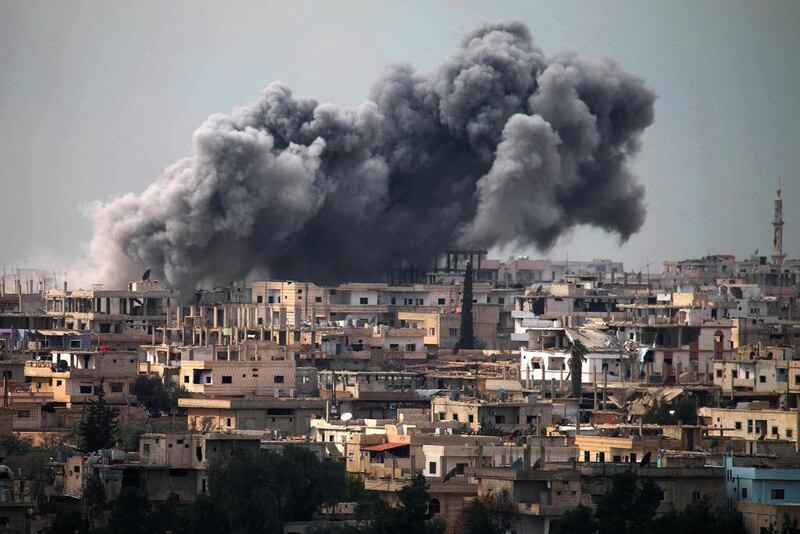Last week, some in the Syrian opposition were fired up by reports that Saudi Arabia asked the Syrian opposition to accept Bashar Al Assad's survival as a fact. The alleged request took place during a meeting between the Saudi foreign minister, Adel Al Jubeir, and the opposition's High Negotiations Committee.
The Saudi foreign ministry disputed the accuracy of the reports. According to an opposition figure present at the meeting, Mr Al Jubeir merely conveyed to the opposition that the focus of the international community has shifted away from any attempts to bring down the regime and that various opposition blocs should come together to form a broader negotiation front. Opposition members fear that a new Saudi stance would reverse an earlier opposition consensus in Riyadh in December 2015 that Mr Al Assad should leave at the start of a transitional period.
Saudi Arabia and regional allies recently moved to reshuffle the opposition's structures, to expand the representation of the hawks-dominated and divided HNC and to stem the influence of extremists within the political and military bodies. There is also a plan to bring together the opposition blocs known as the "Cairo platform" and "the Moscow platform".
Notwithstanding official rhetoric, though, even the most committed of the rebel backers have already moved well beyond the acceptance of Mr Al Assad as a reality. Some countries have taken steps with the assumptions that the regime is not going anywhere. The problem for the Syrian rebels is that they still fail to see the changes, especially in regional countries they consider to be their strongest backers.
When Donald Trump was elected the president of the United States, Gulf countries wishing to undercut the growing Iranian influence in Syria considered lifting pressure from the regime in Damascus as a way to reduce its need for Iran. The most damaging policy change to the Syrian opposition is that of Turkey, the rebels' most critical backer. While many in the opposition continue to see Ankara as a patron of their cause, Turkey's priorities today often run counter to their interests.
_______________
More from the author
[ Terrorists hijacked a single verse to justify their crimes. It's time to match their vigour ]
The story of Hayat Tahrir Al Sham's rise to prominence and what it means for Syria
_______________
Ankara shifted its Syria policy last year, specifically after it launched an operation to fight ISIL in August. It moved from aggressively backing the rebel cause to focusing on disrupting Kurdish expansion near its borders. It has since worked closely with Russia and Iran - politically in Astana, the Kazakh capital, and militarily on the ground.
Turkey has arguably done the most to steer the conflict into the current political trajectory. Politically, Turkey enabled what can be called the "Astana-isation" of the Geneva process. The Astana Process is a Russia-led platform essentially designed to change the nature of the conversation about the future of Syria, even if the Geneva process remains in place. American officials continue to speak of the Geneva process as the main legitimate international platform. But that is largely meaningless given how the conversation has developed over time. Turkey has been a key factor in this change.
The change in Turkish policy contributed to the rebels’ loss of Aleppo in December last year. Turkey and Iran brokered a deal in four Syrian towns near the Lebanese and Turkish borders that involved relocation of demographics. Ankara also watched as Al Qaeda’s Hayat Tahrir Al Sham, formerly known as Jabhat Al Nusra, tightened its control in Idlib near its border.
_______________
More on Syria
[ Muslim countries have highest rates of suicide, murder, rape and mental health problems ]
[ The world must not give up on Syrians ]
We need to resolve humanitarian crises in innovative ways
_______________
Turkey also stood idly by as Hayat Tahrir Al Sham weakened and fragmented Ahrar Al Sham, a previously key Turkish proxy in Syria, and forced it to give up control of a Syria-Turkey border crossing. Turkey also pressured Syrian rebels to participate in the Russia-sponsored Astana talks.
Additionally, Turkey also opposed the participation of opposition fighters in the fight against ISIL under the umbrella of the US-backed Syrian Democratic Forces, and continues to do in key areas like Deir Ezzor. This policy runs counter to the rebels' interests since the United States insists on working solely with the SDF. Privately, some of these rebels understand that working under the US-backed umbrella will help them liberate and govern their own areas. Publicly, they feel under pressure to reject working with the "enemy" of their supposed Turkish ally.
Before its policy changes last year, Turkey, more than any other country and repeatedly over five years, had promised the opposition an “imminent” plan to establish no-fly zones and bring the full force of the international community to bear against Mr Al Assad. It had also focused its support to Islamist and jihadist elements within the opposition, although not exclusively. These policies raised the opposition’s expectations and strengthened extremists.
Despite such policies, most in the Syrian opposition see Turkey as an ally, mostly due to Turkey's public support for the opposition's cause and its commendable support for Syrian refugees. But it is time for the Syrian opposition to realise that Turkey is not in the same place today. It has been a critical enabler of the Russian strategy in Syria for at least a year.
The rebels have lost historic opportunities to expand their influence in territories previously occupied by ISIL. They are now set to lose what remains of their areas if they continue to be tools to their supposed backers in the region. Recognition of the recent policy changes in Turkey, and indeed other countries, could help the Syrian opposition think clearly about its future.
Hassan Hassan is a senior fellow at the Tahrir Institute for Middle East Policy





